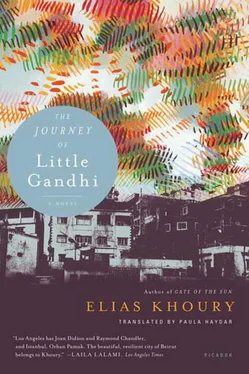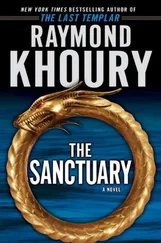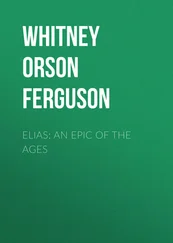At Elias al-Halabi’s funeral, he trampled over the man and took off.
That was many years ago, but when Gandhi told the story to Dr. Davis, he said “last year.” The tall American professor smiled and said it happened in 1935, around thirty years ago.
“Whatever,” Gandhi said.
Gandhi was with everyone else, everyone went. That day the electric tram of Beirut went off the track. All of Beirut and the funeral procession were in Burj Square. People gathered on balconies and climbed the walls. Gandhi was on the balcony of Kawkab al-Sharq. And while the coffin floated over the heads, and Abdu al-Inkdar, and Saad al-Deen Shatila, and Ghandoor Zuraiq walked with their bamboo sticks under the coffin, and the funeral dirges filled the place, the balcony of Kawkab al-Sharq collapsed. The people were tiny, they looked like short scurrying bodies beneath a coffin the size of your hand. Everyone was running and screaming. Gandhi stood surrounded by a lot of people, among them Hasan al-Atrash, who sold betting tickets at the horse races. Hasan al-Atrash died. His head was squashed beneath the slab of concrete that fell. Gandhi shook with the ground and fell down. He said it felt as though things were spinning, as if he were falling into a deep valley. I stood up, he said he stood up and tried to run. People were on the ground, and the ground was on top of the people, and the coffin of Elias al-Halabi sped off as if it were running away.
I trampled over him. Gandhi said he trampled over a man. “I may have killed him, I don’t know, maybe, I don’t know. But I took off, I became a runaway, as if I were a criminal, running to I don’t know where, I kept walking till I got home, and at home I slept, I put my head down on my pillow and went to sleep. And I never wanted to get up, I couldn’t.”
Gandhi told Alice he didn’t know why he loved to sleep that much. In this world you can’t open your eyes; if you do, everything starts spinning. Nothing has any taste to it.
Alice believed that things had a lasting flavor. She couldn’t forget that things have a taste that stays in your mouth, even after they’re gone.
When the Egyptian said to her that Beirut is like cardboard, her eyes smiled.
“You don’t know anything, my friend. What do you mean, cardboard? The whole world is cardboard, but Beirut never slept, even now it doesn’t sleep. Who can sleep in a place where there is no sleep? You’re all sleepy because you’re afraid, I’m not afraid, I don’t sleep and I’m not afraid.”
Zaylaa would look at her, trying to scare her, and Alice wasn’t scared. She told him the real bullies were dead, and he, with his short hair like the American soldiers, didn’t scare her.
“The bullies are gone, Ibn Zaylaa, you son of a bitch.”
Ibn Zaylaa would let her get away with it, not because he was a son of a bitch, but because she was a poor soul.
What did this woman know about bullies? Before Zaylaa killed his sister by strangling her with his bare hands, he’d killed many others. Zaylaa was a soldier in the Lebanese army, then the war started and he became just like everyone else.
“When the war comes we fight,” he said to Lieutenant Ahmad al-Hasan. “Sir, we need to live, we need to buy televisions, we need money, we need war.”
Zaylaa went to war. The day he saw Captain Salah Aamer crying like a baby, he understood that the war would go on without those who philosophized and discussed the war of the people and the masses, those would die, and the war would go on without them. Zaylaa left these organizations and went where he should go. There wasn’t one organization or group he didn’t work for. He trafficked hashish and traded weapons and wound up in charge of the Montana Bar.
“I protect the bar. Without me, what would’ve happened to all of you?” he said to Alice.
“You’re right, Zaylaa, without you we’d have become prostitutes, now we’re respectable ladies, without you, someone else would’ve come along.”
“I’m better than some, Madam.”
“You’re just like the others, you’re not special, you are the others, ask me, I’ll tell you, but you don’t know how to talk and you don’t know how to listen.”
“Shut up! If you don’t like it, leave.”
“I don’t like it, but I’ll shut up. I’ll shut up because the conversation is over, when the conversation is over I’m no longer the Alice whom …”
“I know, I know,” Zaylaa said. “Please, don’t tell us about “The Leader” and Abd al-Karim Qasim and all that bullshit.”
“What’s there to tell?” Alice said to Gandhi.
Gandhi liked Hasan Zaylaa. “If it weren’t for him, they’d have killed me,” he said to her. Gandhi said they wanted to kill him because he lived in the cellar of Burj al-Salam. The cellar was empty when Gandhi fled from Nabaa and came to live in it. Some armed men came and told him to get out. And if it hadn’t been for Zaylaa, he would’ve been killed.
“Zaylaa is a good man, but he’s temperamental. He gets drunk and says whatever come to his mind, but he has a good heart.”
“Right,” Alice said, and decided to be quiet.
One of those mornings, Gandhi was sitting alone in front of his box. He had placed the metal shoe trees on the ground, waiting for some shoes. He saw Dr. John Davis coming in the distance. The American professor was walking, his dog next to him, a big dusty-colored German shepherd that growled and barked. Gandhi asked God for refuge from seeing him so early in the morning. Dr. Davis stopped in front of the shoe-shine box, holding the rope tied to the dog’s neck, and the dog moved left and right, sniffing and putting his mouth on the shoe trees. The American pulled his dog back. And the dog would go close to the shoe trees and head in Gandhi’s direction, sniff at the sitting man’s feet, and Gandhi would try to get away from the dog, move his feet away, pretend to be busy with the shoe trees and shoes, and wipe his face with his long black sleeve. Dr. Davis asked how things were going, while the dog roamed about, with his master holding the rope. Then the dog got away from Davis’s hand. The dog ran off, and Davis called him—“Fox! Fox!”—and the dog ran as if he’d found something. Dr. Davis left Gandhi and chased after his dog. A woman came and placed three pairs of men’s black shoes in front of the box. Gandhi put them up on the shoe tree and started working. Gandhi didn’t like to dye shoes until he’d stretched the leather out on the shoe tree. The original way of doing it, he believed, was to dye the shoes without taking them off the person’s foot. The foot gave the shoe its form and stretched it out, and so the color would spread equally over the entire shoe. But when the shoe is without a foot, the leather gets wrinkled, and it becomes difficult to dye it, because the transformation to mirror becomes impossible.
Gandhi had finished mounting the shoes on the shoe trees when he saw Dr. Davis coming back with his dog. That day, John Davis made the suggestion that would make Gandhi leave his profession for the first time. He would leave it for the second and last time, based on a suggestion made by Hasan Zaylaa, when he would become responsible for keeping the quarter clean.
Mr. Davis stopped and asked him if he would help him feed his dog.
“I don’t have anything, just shoes,” Gandhi said.
Gandhi agreed to Mr. Davis’s idea without ever imagining it would lead him to leave his trade.
Gandhi went into the American University cafeteria with a big burlap bag in his hand. Davis told him he’d made an arrangement with the kitchen manager and the American director of the kitchen to allow Gandhi to take the leftovers every day, take them to his house near Bakhaazi Hospital as food for Fox, who seemed he could never get enough to eat. He agreed with Gandhi to pay him one lira a day, and at that time a shoe shine was a quarterlira. In other words, filling the bag was as good as shining four pairs of shoes.
Читать дальше












